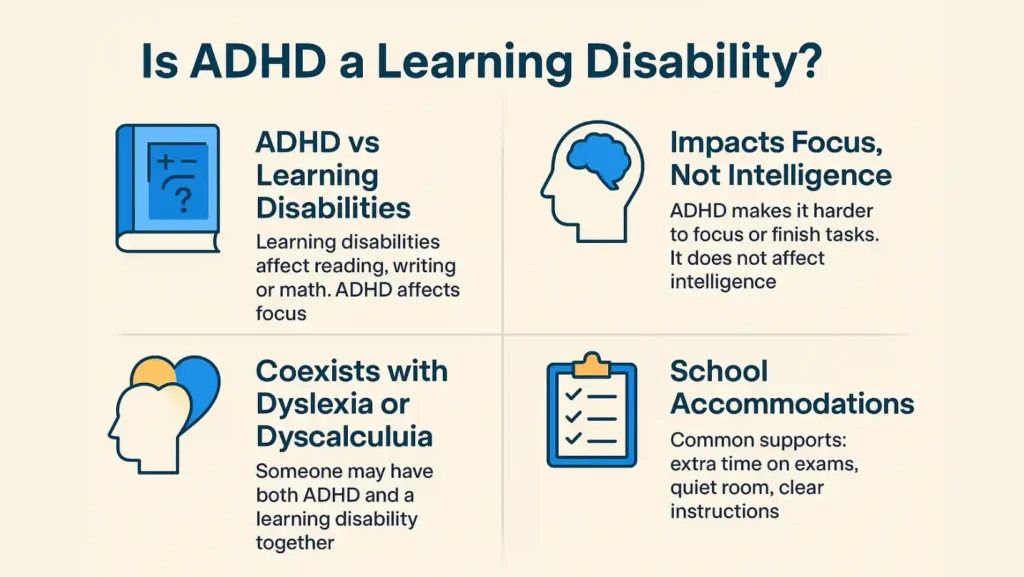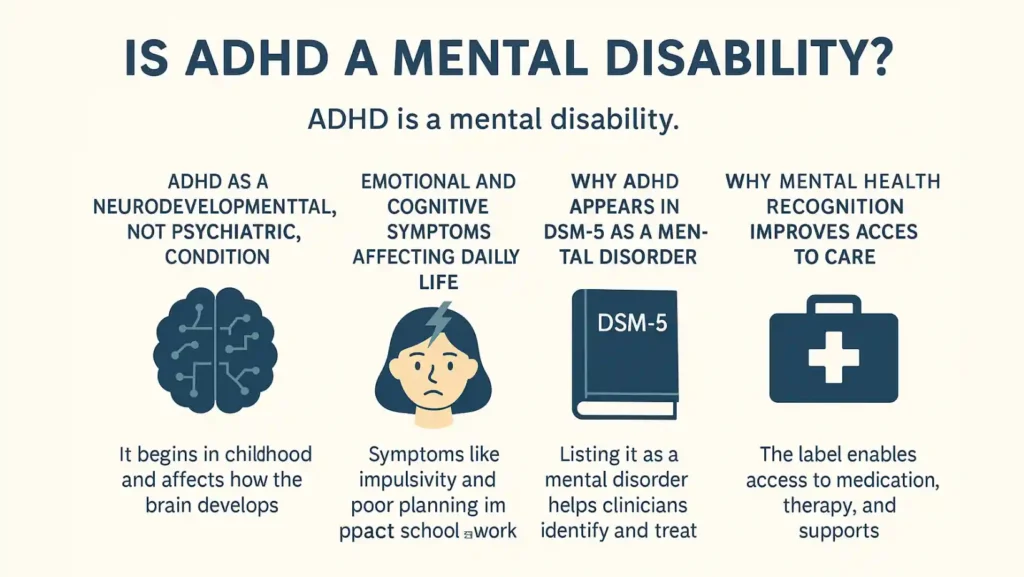ADHD is a disability because the symptoms affect school, work and life. When your attention-deficit/hyperactivity disorder (ADHD) limits your daily life significantly, it can meet legal and medical definitions of disability. That means you might qualify for supports at school, accommodations at work and even disability benefits.
Table of Contents
ToggleWhat Does “Disability” Mean?
A “disability” generally means a condition that makes it harder for you to do important life tasks, like learning, working, focusing, or even joining in everyday activities. It doesn’t just mean you have a diagnosed condition. What matters is how much it affects what you can do.
How Disability Is Defined by WHO, ADA, and DSM-5
- The World Health Organization (WHO) defines disability in terms of how a health condition affects your body, your ability to act, and your participation in life.
- The Americans with Disabilities Act (ADA) defines a disability as a “physical or mental impairment that substantially limits one or more major life activities.”
- The Diagnostic and Statistical Manual of Mental Disorders, Fifth Edition (DSM-5) lists ADHD as a neurodevelopmental disorder (i.e., a brain-development condition) and shows how it must affect your life to earn that diagnosis.
Difference Between a Medical Condition and Legal Disability
You can have a medical condition (like ADHD) and not have a legal disability status. That’s because legal status depends on whether your condition limits your major life tasks significantly. In many places, you must show documentation of how the condition affects you daily.
Why ADHD Can Be Both a Medical and Functional Disability
If ADHD impacts your ability to concentrate, stay organized, follow through with tasks, learn or work, then yes: your ADHD may meet the definition of a disability. It is medical (a diagnosis) and it is functional (affects daily tasks), so ADHD is a disability “in this case, yes.”
How Disability Definitions Differ Across Countries
Laws vary by country.
- In the U.S., protections come under the ADA and the Individuals with Disabilities Education Act (IDEA).
- In the U.K., the Equality Act 2010 protects people with disabilities, including ADHD, in all aspects of life.
- In Canada and other places, there are similar human-rights laws.
So whether ADHD is a disability depends a lot on where you live and how badly your ADHD affects you.
Is ADHD a Learning Disability?

ADHD is a learning disability. But having ADHD doesn’t mean you have trouble with learning itself, like dyslexia or dyscalculia, but it can affect learning.
ADHD vs Learning Disabilities — Key Differences
Learning disabilities are specific problems with skills like reading, writing or math. ADHD affects attention, impulse control and organisation. They can occur together, but ADHD on its own is not called a learning disability.
Why ADHD Impacts Focus, Not Intelligence
People with ADHD often struggle with focus, planning, remembering, starting tasks or finishing them. That does not mean they are less smart. The brain works differently. So yes, ADHD is a learning disability. ADHD affects how you learn, not your intelligence.
When ADHD Coexists With Dyslexia or Dyscalculia
It’s common for someone to have ADHD and a separate learning disability. For example, a student might have difficulty concentrating (ADHD) and also difficulty reading (dyslexia). Schools must test both conditions because support for one doesn’t automatically help the other.
School Accommodations Under IDEA and Section 504
If you are a child or teen and your ADHD makes learning hard, your school might offer help under Section 504 or IDEA. Section 504 is an anti-discrimination law; IDEA provides special education when you meet strict criteria.
Common Supports
Typical accommodations: extra time on exams, quiet room, clear instructions, breaks, chunked tasks. These don’t change what you learn; they help you learn despite ADHD.
Is ADHD a Mental Disability?

ADHD is a mental disability. ADHD counts as a mental health condition, and it fits the “disability” label when it affects the mind and daily life.
ADHD as a Neurodevelopmental, Not Psychiatric, Condition
ADHD is labelled a neurodevelopmental disorder because it begins in childhood and affects how the brain develops. That means it’s structurally different from some mood disorders. The classification helps ensure relevant treatment.
Why ADHD Appears in DSM-5 as a Mental Disorder
Although neurodevelopmental, ADHD appears in DSM-5 under “mental disorders” because it includes patterns of behaviour and thinking that impact daily life. This helps clinicians recognise and treat it.
Emotional and Cognitive Symptoms Affecting Daily Life
With ADHD, you might struggle with impulsivity, forgetfulness, restless thoughts, and poor planning. These symptoms can make school, work, and relationships harder. When those effects are strong and persistent, then your condition can qualify as a disability.
How ADHD Relates to Anxiety and Depression
Many people with ADHD also get anxiety or depression. These additional conditions may increase how much ADHD limits you. Recognising mental-health links helps you access better treatment.
Why Mental Health Recognition Improves Access to Care
When ADHD is recognised as a condition that affects your thinking and functioning, you become eligible for support: therapy, medication, and accommodations at work or school. This recognition improves your access to care and legal rights.
Is ADHD Considered a Disability in Education?
Yes, often it is, especially when it impacts learning significantly. ADHD is considered a disability in school; it often depends on how an individual’s case fits the law.
Legal Frameworks: IDEA vs Section 504 Explained
- IDEA: For children who need special education because their disability affects learning.
- Section 504: For children who need accommodations because a disability limits major life activities (not necessarily needing special education).
Qualifying for an IEP (Individualised Education Plan)
Under IDEA, after evaluation, if your ADHD significantly limits your ability to learn, you may get an IEP. That plan sets goals and support.
Academic Accommodations for ADHD Students
In school, you might get extra time, a quieter space, task breakdowns, and frequent check-ins. These help your brain manage ADHD in the learning context.
Role of Parents in the Evaluation Process
Parents (or you if you’re older) ask for evaluation, provide reports, and join team meetings. Your voice matters. If you suspect ADHD is affecting you, ask for a school evaluation.
Early Diagnosis and Its Long-Term Academic Impact
If ADHD is identified early and support is given, learning can improve. If it is missed, school failures, low self-esteem and dropped chances may follow. That means early help matters.
Is ADHD a Disability in the Workplace?
Yes, when ADHD limits your major life activities such as working, thinking or focusing. People with ADHD disability in the workplace have legal protections and rights.
How ADHD Qualifies Under the Americans with Disabilities Act
Under ADA, if your ADHD limits a major life activity and you are qualified for a job, you are protected. Employers must make reasonable accommodations unless the cost is too high or it fundamentally changes the job.
Employee Rights and Reasonable Accommodations
You have the right not to be discriminated against for ADHD. You can ask for accommodations like flexible hours, remote work, clear instructions, quiet workspace.
Common Accommodations
For example: start work later, use headphones to block noise, get written tasks instead of verbal only, and get frequent check-ins. These help you manage the work environment.
Employer Responsibilities and Confidentiality
Your employer must keep your information private. They need to review accommodation requests seriously. You can’t be penalised for asking.
Should You Disclose ADHD to Your Employer?
Disclosure is up to you. If you need accommodations, disclosing helps. If you can manage without, you might choose not to. It’s about your needs, your workplace culture and the pros/cons.
What to Do if Workplace Accommodations Are Denied
If your request is denied, ask for the reasons in writing. Seek internal grievance procedures. If that fails, you may consult a lawyer or file a claim with the relevant agency (e.g., EEOC in the U.S.). Document everything.
ADHD and Disability Benefits
ADHD and one of its disability benefits is that someone with ADHD can get government help because their ADHD limits their life, but it’s difficult.
Understanding SSA Rules for ADHD Disability
In the U.S., the Social Security Administration (SSA) doesn’t have a listing just for ADHD. You must show that your ADHD severely limits your ability to work. The test is strict.
SSI vs SSDI — What’s the Difference?
- SSI (Supplemental Security Income) is need-based (low income/resources).
- SSDI (Social Security Disability Insurance) is based on your work history and contributions.
Both require you to meet the disability standards.
Documents Required for ADHD Benefit Claims
You need medical records, psychological test results, statements from teachers or employers showing how ADHD limits you, work history, and accommodations you tried. The documentation matters a lot.
Common Reasons ADHD Claims Are Denied
Claims fail when: your symptoms are mild, you have no documentation, your age or education allow you to do other work, or you haven’t tried accommodations. Showing strong proof of limitation is key.
How to Strengthen Your Disability Application
Gather strong evidence: test results, professional evaluation, past work and school reports, and records of accommodations tried and their effects. An attorney or advocate can help.
ADHD in Adults vs Children
ADHD as a disability may feel different when you’re an adult than when you were a child.
How ADHD Symptoms Evolve Over Time
Children often show hyperactivity outwardly. Adults may appear restless internally, have trouble organising, procrastinate, burn out. The outward signs change, but the core – trouble with focus and self-control – remains.
Why Adults Face Unique Workplace Challenges
Adults manage many responsibilities: household, finances, job, and relationships. ADHD can make organising, prioritising, remembering and following through harder. That can affect work performance, job stability and life satisfaction.
ADHD’s Impact on Relationships and Independence
ADHD may affect how you communicate, handle your emotions, keep commitments and manage time. This can strain friendships, romantic relationships, parenting and independence.
Support and Therapy Options for Adults
Treatment for adults includes medication, cognitive behavioural therapy (CBT), coaching, time-management tools and support groups. These can improve the quality of life regardless of disability status.
Transition Planning for Teens Leaving Special Education
When a teen with ADHD leaves school or special education, they need a transition plan: how to move into college, vocational training or employment, how to self-advocate and access accommodations. The support should shift from parents and schools to the young adult.
Legal Status of ADHD Disability
When dealing with laws, you ask about the legal status of ADHD disability; how laws recognise ADHD and protect you.
ADA (U.S.) — Workplace and Education Protection
In the U.S., ADA covers employment, public services and, to some extent, education. It gives protection if your ADHD limits major life activities.
IDEA (U.S.) — Educational Rights for Students
IDEA ensures children with disabilities get a Free Appropriate Public Education (FAPE). It can apply if ADHD significantly impacts learning.
Equality Act (U.K.) and Canada’s Human Rights Protections
In the U.K., the Equality Act protects people with disabilities, including ADHD when it causes substantial disadvantage. Canada has human rights laws, too. These laws recognise ADHD in many cases when it limits life activities.
How ADHD Is Recognised Globally
Worldwide, recognition varies. Some countries refer to the WHO definitions. Many laws are adapting to include ADHD under “disability” when the condition limits life tasks. The key is the limitation, not just the diagnosis.
Legal Recognition Ensures Access and Equality
When your ADHD is legally recognised as a disability, you gain rights: to accommodations, to not be discriminated against, and to receive support. Without recognition, you might miss these rights.
Common Myths About ADHD and Disability
| Myth | Truth |
| “ADHD isn’t serious enough to count.” | False — if ADHD affects your daily tasks significantly, it does qualify as a disability. |
| “Only kids qualify for ADHD benefits or supports.” | False — adults can also qualify under workplace and disability laws like the ADA. |
| “Medication is required for disability status.” | False — medication helps, but legal disability depends on functional limitations, not treatment choices. |
| “Employers can’t hire people with ADHD.” | False — employers are legally barred from discriminating based on ADHD if it qualifies as a disability. |
| “ADHD means low intelligence.” | False — ADHD affects focus and self-control, not IQ; many with ADHD are highly intelligent and creative. |
How to Apply for ADHD Disability Support
- Get a clear diagnosis and full medical evaluation.
- Gather documentation: school records, work history, test results, and physician reports.
- Work with professionals: doctors, psychologists, and legal advocates.
- Submit your claim under the correct system (school, work or benefits).
- Keep records of every step: requests, responses, evaluations.
- If denied, appeal. Use legal advice, gather more evidence and show why your ADHD limits you.
Managing ADHD With or Without Disability Status
Even if you do or don’t qualify for “disability” status, you still can live a full life with ADHD. Treatment is key. It may include medication, therapy (such as CBT), coaching, and organisational tools. Use tools like planners, reminders, and structured routines. Join support groups or ADHD communities. Seek legal and financial resources if you qualify for support or accommodations.
FAQs
Is ADHD a disability under the ADA?
Yes, ADHD may be a disability under the ADA if the condition limits major life activities like concentrating, learning or working, and you meet the legal criteria.
How does ADHD qualify for Social Security benefits?
If your ADHD severely limits your ability to work and you have documentation of that limitation, you may qualify for disability benefits – but the process is rigorous.
Is ADHD a mental, neurological, or learning disorder?
ADHD is a neurodevelopmental disorder (brain development condition) listed in mental disorders manuals and often associated with learning difficulties, though it itself is not classed as a learning disability.
What rights do employees with ADHD have?
Employees have the right to reasonable accommodations under laws like the ADA if their ADHD meets the legal definition of disability and they inform the employer of their needs.
Can you work full-time with ADHD disability status?
Yes, many individuals with ADHD and disability status work full-time. The status is about limitations and support, not the inability to work at all.
What accommodations help adults manage ADHD at work?
Accommodations like flexible scheduling, written rather than verbal instructions, quiet workspace, regular check-ins, use of planners, and technology reminders can help significantly.
Does ADHD qualify as a disability worldwide?
Recognition varies by country. Many places allow ADHD to qualify as a disability when it limits major life activities, but exact rules depend on the local laws and how your case is documented.
About The Author

This article is medically reviewed by Dr. Chandril Chugh, Board-Certified Neurologist, providing expert insights and reliable health information.
Dr. Chandril Chugh is a U.S.-trained neurologist with over a decade of experience. Known for his compassionate care, he specializes in treating neurological conditions such as migraines, epilepsy, and Parkinson’s disease. Dr. Chugh is highly regarded for his patient-centered approach and dedication to providing personalized care.
→ Book a consultation to discover which remedies suit your needs best.






